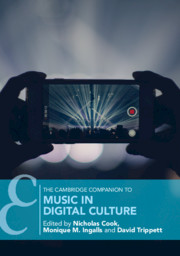Book contents
- The Cambridge Companion to Music in Digital Culture
- Cambridge Companions to Music
- The Cambridge Companion to Music in Digital Culture
- Copyright page
- Contents
- Figures
- Contributors
- Acknowledgements
- Introduction
- 1 Digital Technology and Cultural Practice
- Personal Take: Whatever Happened to Tape-Trading?
- 2 Toward a History of Digital Music: New Technologies, Business Practices and Intellectual Property Regimes
- Personal Take: On Serving as an Expert Witness in the ‘Blurred Lines’ Case
- 3 Shaping the Stream: Techniques and Troubles of Algorithmic Recommendation
- Personal Take: Being a Curator
- Personal Take: Can Machines Have Taste?
- 4 Technologies of the Musical Selfie
- Personal Take: Vaporwave is Dead, Long Live Vaporwave!
- 5 Witnessing Race in the New Digital Cinema
- Personal Take: Giving History a Voice
- 6 Digital Devotion: Musical Multimedia in Online Ritual and Religious Practice
- Personal Take: Technicians of Ecstasy
- Personal Take: Live Coded Mashup with the Humming Wires
- Personal Take: Algorave: Dancing to Algorithms
- 7 Rethinking Liveness in the Digital Age
- Personal Take: Augmenting Musical Performance
- Personal Take: Digital Demons, Real and Imagined
- Personal Take: Composing with Sounds as Images
- Personal Take: Compositional Approaches to Film, TV and Video Games
- 8 Virtual Worlds from Recording to Video Games
- 9 Digital Voices: Posthumanism and the Generation of Empathy
- Personal Take: In the Wake of the Virtual
- 10 Digital Inequalities and Global Sounds
- 11 The Political Economy of Streaming
- Bibliography
- Index
- References
5 - Witnessing Race in the New Digital Cinema
Published online by Cambridge University Press: 30 August 2019
- The Cambridge Companion to Music in Digital Culture
- Cambridge Companions to Music
- The Cambridge Companion to Music in Digital Culture
- Copyright page
- Contents
- Figures
- Contributors
- Acknowledgements
- Introduction
- 1 Digital Technology and Cultural Practice
- Personal Take: Whatever Happened to Tape-Trading?
- 2 Toward a History of Digital Music: New Technologies, Business Practices and Intellectual Property Regimes
- Personal Take: On Serving as an Expert Witness in the ‘Blurred Lines’ Case
- 3 Shaping the Stream: Techniques and Troubles of Algorithmic Recommendation
- Personal Take: Being a Curator
- Personal Take: Can Machines Have Taste?
- 4 Technologies of the Musical Selfie
- Personal Take: Vaporwave is Dead, Long Live Vaporwave!
- 5 Witnessing Race in the New Digital Cinema
- Personal Take: Giving History a Voice
- 6 Digital Devotion: Musical Multimedia in Online Ritual and Religious Practice
- Personal Take: Technicians of Ecstasy
- Personal Take: Live Coded Mashup with the Humming Wires
- Personal Take: Algorave: Dancing to Algorithms
- 7 Rethinking Liveness in the Digital Age
- Personal Take: Augmenting Musical Performance
- Personal Take: Digital Demons, Real and Imagined
- Personal Take: Composing with Sounds as Images
- Personal Take: Compositional Approaches to Film, TV and Video Games
- 8 Virtual Worlds from Recording to Video Games
- 9 Digital Voices: Posthumanism and the Generation of Empathy
- Personal Take: In the Wake of the Virtual
- 10 Digital Inequalities and Global Sounds
- 11 The Political Economy of Streaming
- Bibliography
- Index
- References
Summary
One of the most important recent developments in practices of recording and listening to digital audio has been the documentation of police violence against marginalised communities, especially African Americans. Prior to the digital, audio-visual technologies served to document similar forms of racist violence as in the killing of Emmett Till (photography) or the beating of Rodney King (home video). But the increasing ubiquity of handheld recording devices has intensified and expanded those dynamics of documentary, creating new modes of witnessing race, bodies and power. In turn, these new forms of witnessing, which have played a central role in the Black Lives Matter movement, call for equally new forms of reception – ways of listening, viewing, sharing, and, in turn, recording, that amplify and disseminate that multimedia witnessing. Key examples of such witnessing, including Beyoncé’s Lemonade and recordings of police killing Philando Castile, offer sober reminders of the stakes of digital cinema.
Keywords
- Type
- Chapter
- Information
- The Cambridge Companion to Music in Digital Culture , pp. 124 - 146Publisher: Cambridge University PressPrint publication year: 2019
References
For Further Study
- 1
- Cited by

